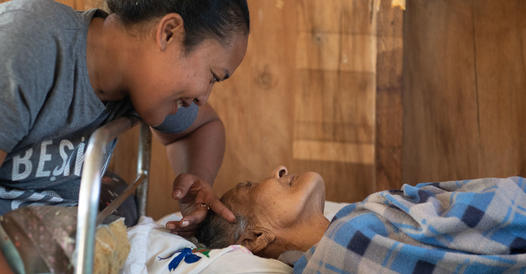Long term care for older people in Tonga remains under-developed – with estimates putting life expectancy to increase to above 70.2 years for men and 76.2 years for women in the next two decades.
Five years ago, Tongans over the age of 60 made up 5.9 percent (6,136) of the total population of 104,000, and this is expected to reach 8.9 percent (11,926) by 2050, according to the Asian Development Bank (ADB).
Majority of older persons – around 71 percent live in rural areas and the outer islands, while 29 percent reside in urban areas.
“The level of poverty among older people (i.e., living on less than $1.90 a day) is 22.1 percent with those in the rural areas and the outer islands affected more than urban residents. The gap between the rich and poor is significant, therefore the need for aged care is evident from the research, supported by interviews with older people, caregivers, and stakeholders, said the ADB that conducted a diagnostic study in 2021 on the long term care for the island kingdom’s older population.
“Care for older people has not received the necessary attention from policy makers, and this is at least partly due to the traditional view that aged care is a family obligation. However, without more aged care programmes and budget support from the government and international agencies, the challenge of the older population will grow, while the lack of specific legislation to protect older people will leave them vulnerable to abuse.”
Speaking to PACNEWS in Manila, ADB’s Senior Social Development Specialist (Aging and Care), Meredith Wyse said the island nation has now developed an Aged Care Strategic Plan – and the ADB is assisting Tonga expand it into an integrated aged care services that not only benefits the elderly but the whole community.
“Back in 2021, Tonga developed an Aged Care Strategic Action Plan. From that, there was a request to really look at expanding the services for older people. So it’s been a project in development since then. There are three key elements of the project – one is the construction of community centres because we really want to support people in their homes and their communities and keep people engaged in their communities. The second component is about developing the services that are appropriate for older persons and their families. The third component is really looking at activities supporting caregivers, explained Wyse.
“These community centres will be called integrated Aged Care Centre. These centres will be opened for the wider community as well. We don’t want to segregate them. It’s really important for the older people to engage with the wider community, said Wyse.
Projections from the 2016 census in Tonga indicate that the pace of aging in the Pacific nation will accelerate over time, with women living longer than men. It is projected that, by 2033, 10 percent of the population will be 60 years or older, and will rise to 13 percent by 2050.
Mindful of its obligation to take care of its aging population, the government in 2010 legislated the National Retirement Benefits Scheme – specifically aimed at older people. The government directly funded the Social Welfare Scheme for the Elderly at a cost of T$1.4 million (US$582,000), which translates to T$65 (US$27) per month for citizens aged 75 years and above.
This decision was groundbreaking for a small developing island state, especially one with a small population base and tight revenue streams. The policy rationale was sound and based on a growing problem among vulnerable older people. Tonga is the only small developing island state in the Pacific that has introduced such a programme. At the end of June 2018, there were 4,105 eligible older people receiving the social welfare benefit, costing T$3.8 million (US$1.6 million).
SOURCE: PACNEWS














